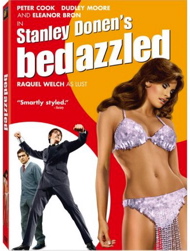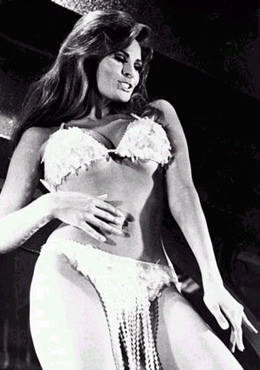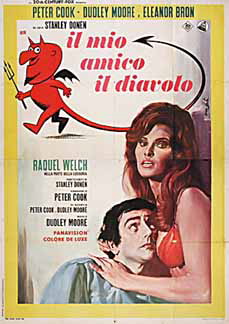| Release List | Reviews | Price Search | Shop | Newsletter | Forum | DVD Giveaways | Blu-Ray/ HD DVD | Advertise |
| Reviews & Columns |
|
Reviews DVD TV on DVD Blu-ray International DVDs Theatrical Reviews by Studio Video Games Features Collector Series DVDs Easter Egg Database Interviews DVD Talk TV DVD Talk Radio Feature Articles Columns Anime Talk DVD Savant HD Talk Horror DVDs Silent DVD
|
DVD Talk Forum |
|
|
| Resources |
|
DVD Price Search Customer Service #'s RCE Info Links |
|
Columns
|
 |
Bedazzled |

|
Bedazzled Fox 1967 / Color / 2:35 anamorphic widescreen / 104 min. / Street Date April 3, 2007 / 19.98 Starring Peter Cook, Dudley Moore, Eleanor Bron, Raquel Welch, Barry Humphries, Alba, Michael Bates, Robin Hawdon, Evelyn Moore Cinematography Austin Dempster Art Direction Terence Knight Film Editor Richard Marden Original Music Dudley Moore Written by Peter Cook and Dudley Moore Produced and Directed by Stanley Donen |
One of the funniest films of the 1960s, Peter Cook and Dudley Moore's original Bedazzled still makes audiences roar with laughter. The British comedy pair's takeoff on Faust is more than a collection of stand-up skits or Goon Show lunacy. Director Stanley Donen supplies the technical polish and lets Cook and Moore's witty script do its magic. Bedazzled is guaranteed to make one laugh out loud, even if sitting alone.
In 1967 Bedazzled was promoted as an irreverent, intellectual comedy. Most of America had never heard of Peter Cook and Dudley Moore. The picture caught on only in big cities, college towns and in the pages of Playboy, which called it "The Thinking Man's Comedy of the Year."
The basic gag is that George Spiggott -- the Prince of Darkness -- hustles the poor schlub Stanley into signing away his soul, and then repeatedly scuttles his attempts to woo Margaret Spencer. For each of his seven wishes, Stanley is set up in a different amorous scenario with his beloved: as a pop star, an intellectual, a millionaire. But Spiggott takes a role in each fantasy to put the kaibosh on Stanley's plans. When called to explain why he invades Stanley's fantasies, Spiggott shrugs, "There's a bit of me in everybody."
Much of the humor plays like burlesque written by literature professors. In the 'Millionaire' skit the mortified Stanley gives his wife Margaret expensive gifts even as she carries on an affair with her harp teacher (Robin Hawdon). George Spiggott's character unleashes a battery of crude sexual references, all layered beneath upper class Brit snob-talk. The 'Intellectual' Stanley easily steers student Margaret to his bachelor pad, only to discover that her appreciation of his literary references doesn't translate into a roll in the hay. This cues Mr. Spiggott's timeless advice to collegiate lotharios: "In the words of Marcel Proust - and this applies to any woman in the world - if you can stay up and listen with a fair degree of attention to whatever garbage, no matter how stupid it is that they're coming out with, 'til ten minutes past four in the morning... you're in."

George's payroll is padded with Seven Deadly Sins: Gluttony, Avarice, Sloth, Vanity. Envy is played (hilariously) by the now internationally known Barry Humphries. Prominently displayed on the posters is Lust, or as George calls her, "Lillian Lust, the babe with the bust." That's of course Raquel Welch with a not-bad Southern accent, stripping to red underwear and tantalizing Stanley with off-color double-entendres mixing food and sex. The other Sins are mostly liabilities, except for Anger (Witchfinder General's Robert Russell). He makes the perfect bouncer for George's Hellish nightclub of the Damned, which is decorated in "Early Hitler."
Cook & Moore epitomize the collegiate brand of rude, energetic comedy eager to poke fun at society while showing off their own cleverness. The humor comes at an alarmingly fast pace yet is never scattershot, or silliness for its own sake. The most quoted joke is The Devil's unusual choice of magic words. To launch Stanley on one of his wishes, George turns out the lights, hands Stanley a fireworks sparkler and shouts, "Julie Andrews!" A series of jokes over a pool table skewer stock speculators with an investor's concern that a "Peace Scare" is threatening to wipe out the arms sales business. George Spiggott makes no excuses for his constant nasty tricks, like scratching phonograph records, tearing out the final pages of Agatha Christie mysteries and drilling little holes in oil tankers. It's just a compulsion.
But the 'jokes' also touch upon the Christian concept of God's universe, earnestly explaining some of its basic precepts, such as the idea that God gives us free will to choose between Good and Bad. George was formerly God's favorite angel until he contracted the sin of Hubris and was banished from heaven. Now his job is to tempt humanity, as part of God's plan.
Many of the jokes are satire with a definite point to make. George riles at how limited his powers are compared to God's. "He's omniscient, and I'm just highly maneuverable." He also complains that the cosmos is unfairly weighed in favor of heaven. Spiggott spent fifty years corrupting Mussolini, but the dictator sidestepped damnation via a last minute confession: "Scusi! Milli regretti! And up he goes!"
Spiggott proudly states that he's collected all but a handful of the hundred million souls in his quota deal with God ... soon his penance will be complete and he'll be able to rejoin the other angels in heaven. We feel more than a little trepidation when George, his souls all accounted for, actually takes an elevator into the clouds to meet his maker. Bedazzled is a film blanc and our Sunday-school upbringing makes us a bit nervous wondering how the film can avoid outright blasphemy. Happily, Cook & Moore find a conclusion consistent with the wild comedy tone. It's quite a perfect construction.

Bedazzled also builds an endearing affection for poor Stanley Moon, who starts with a flubbed suicide bid and gets taken for a humiliating ride. He's cuckolded by his best friend, trampled by fickle 'pop fans', transformed into a literal 'fly on the wall' and finally trapped in a nun's habit. And he never once gets to possess the girl of his dreams, the wonderfully thick-brained Cockney Margaret. Eleanor Bron is twice as funny as she was in Donen's Two for the Road, doing half as much. After Stanley's 'suicide' she's courted by Michael Bates' obnoxious Inspector Clarke, much to Stanley's chagrin. No matter how Stanley designs his wishes, George contrives to make sure that some obstacle stands between Stanley and his beloved. Every farce needs a good "sexus-interruptus" running gag, and Bedazzled's is especially clever.
The comedy overdose that is Bedazzled needs to be experienced, not explained. Try and see it with a few friends as opposed to alone. Get ready for The Fruny Green Eyewash Men, The Bouncing Beryllians and the Frobisher and Gleason Ice-Lolly. And don't forget that Big Sister is Watching You.
Fox's DVD of Bedazzled has been released wa-ay after the Harold Ramis remake, leading one to believe that it was perhaps purposely shelved so as not to show up that pale pretender. The eye-popping enhanced color transfer returns the film to its proper Panavision framing. Although never given his due, Dudley Moore was an accomplished musician and his jazzy score comes out strongly on the stereo track. That includes Moore's two satiric 'pop songs' and their hilarious lyrics: "You fill me with inertia."
Leading off the extras, director Harold Ramis sings Bedazzled's praises in a short appreciation interview. Dudley interviews Peter as the Devil in an improvised skit for ABC News, where we can see the normally deadpan Cook start to break up at one point. In fact, a number of editorial up-cuts indicate that he probably broke up several times.
The duo explain their comedy chemistry in an excerpt from The Paul Ryan Show, around 1979. Unfortunately, when asked to analyze their appeal, the two are much less exciting. At least we see them as they presented themselves out of character. A Still Gallery is also included.
On a scale of Excellent, Good, Fair, and Poor,
Bedazzled rates:
Movie: Excellent
Video: Excellent
Sound: Excellent
Supplements: TV skit with Cook & Moore; Cook & Moore interview on The Paul Ryan Show, A conversation with Harold Ramis, Trailer, Still Gallery
Packaging: Keep case
Reviewed: March 30, 2007
Review Staff | About DVD Talk | Newsletter Subscribe | Join DVD Talk Forum
Copyright © MH Sub I, LLC dba Internet Brands. | Privacy Policy | Terms of Use
|
| Release List | Reviews | Price Search | Shop | SUBSCRIBE | Forum | DVD Giveaways | Blu-Ray/ HD DVD | Advertise |





